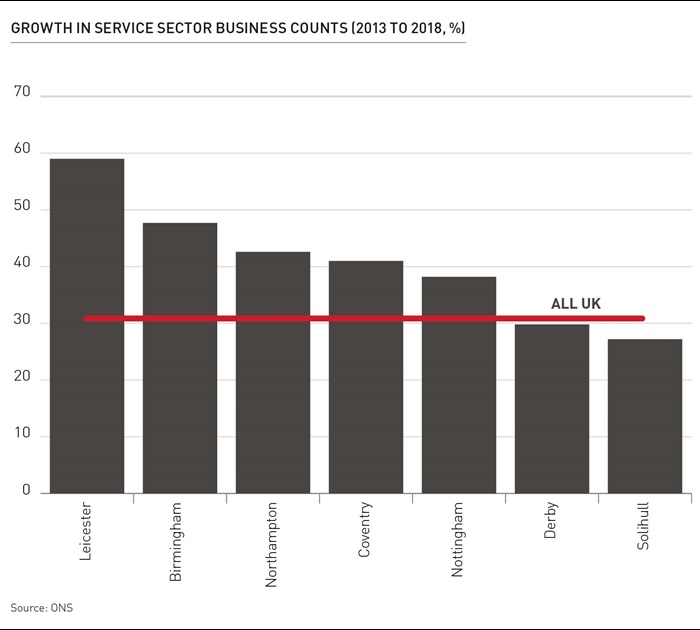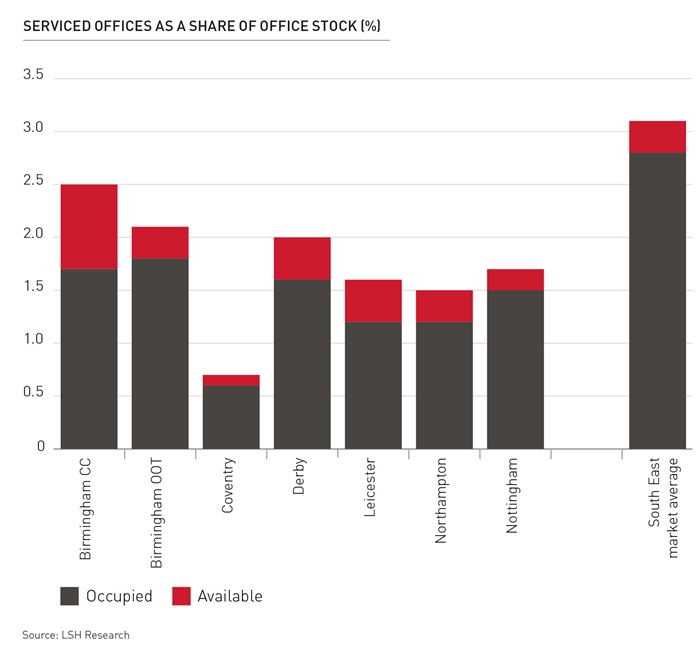WeWork’s emphatic debut into Birmingham is a major statement of intent and a clear vote of confidence in the city’s long term prospects as a business location. As structural change sweeps through the office market, landlords of more conventional offerings cannot afford to stand and watch.
Birmingham's flex phenomenon
In Q2, WeWork’s leasing of 226,000 sq ft
across three separate buildings in Birmingham
city centre was alone equivalent to over 70% of
total take-up in the quarter. As a proportion of
activity, Birmingham has also witnessed more
acquisitions from flex-space operators than
any other UK market over the past 18 months,
including Central London, amounting to well
over a quarter of take-up.
Why now? Why Birmingham?
The recent spike of flex-space activity in
Birmingham is linked to a perfect storm
of factors. In a rush to grab market share,
structural changes to the nature of occupier
demand have preceded something of a ‘space
race’ among operators and their respective
investors. The initial clamour began in Central
London, in 2017, and has subsequently rippled
out to the UK’s other major centres.
Birmingham itself is a prime target for expansive operators. The city boasts a higher rate of growth in service sector businesses than any other major UK city over the past five years and was second only to London for the number of new business start-ups in 2018.
This, alongside a stream of contract-led requirements in the city, is highly conducive to flexible office demand.

And it's still early days
Despite the scale of activity within
Birmingham lately, the growth of flex-space
is off a relatively low base. LSH Research
reveals that while Birmingham is home to the
highest proportion of flex-space among the
region’s key markets, equivalent to 2.5% of
total stock, this is relatively low when viewed
in context with the UK’s South East markets
(3.8%). Indeed, when WeWork’s recent
acquisitions become operational, it will merely
take Birmingham into line with the South East.
There is clearly headroom for growth.
Contrasting occupancy rates
While Birmingham’s scale and positive
attributes merit the attention it has received,
the region’s other key markets should not be
dismissed out of hand. The variation in both
current levels of flex-space provision and
prevailing levels of occupancy should be an
important consideration to both landlords
considering more flexible leasing offers and
serviced office operators seeking to exploit
gaps in the market.
Occupancy levels vary widely between locations; Nottingham and Coventry’s total flexi-space offering currently enjoys a 90% occupancy rate, some way ahead of Birmingham city centre’s which currently stands at only 69%. Meanwhile, with growth of 60% in just five years, Leicester has seen one of the strongest rates of business count growth of anywhere in the UK, which ought to bode well for the demand for flexible solutions.

A wake-up call for landlords
WeWork’s current troubles are well documented but with plenty more serviced office
requirements set to enter the markets, the
recent activity we have seen is no flash in the
pan. So, should landlords of conventional
offerings be concerned?
The tides of structural change will see
more and more occupiers, particularly
at the smaller end of the market, turn to
flexible offerings. Indeed, recent take-up
in Birmingham revealed a thinning of
traditional leasing activity in the sub 5,000
sq ft category, not because of a downturn
in demand per se but rather a transition of
demand from conventional leased offices to
new high quality flex space offerings.
While traditional serviced offices typically lack the wow factor, the new wave of flex space operations are raising the bar in quality, in terms of design, appeal and amenity provision. Landlords of more conventional offices have to adapt their own offerings to meet the growing appetite for an office to reflect a more holistic, aspirational lifestyle that extends beyond only the functional need for space.
Download a copy of our Midlands Office Market Report 2019.
REGISTER FOR UPDATES
Get the latest insight, event invites and commercial properties by email



